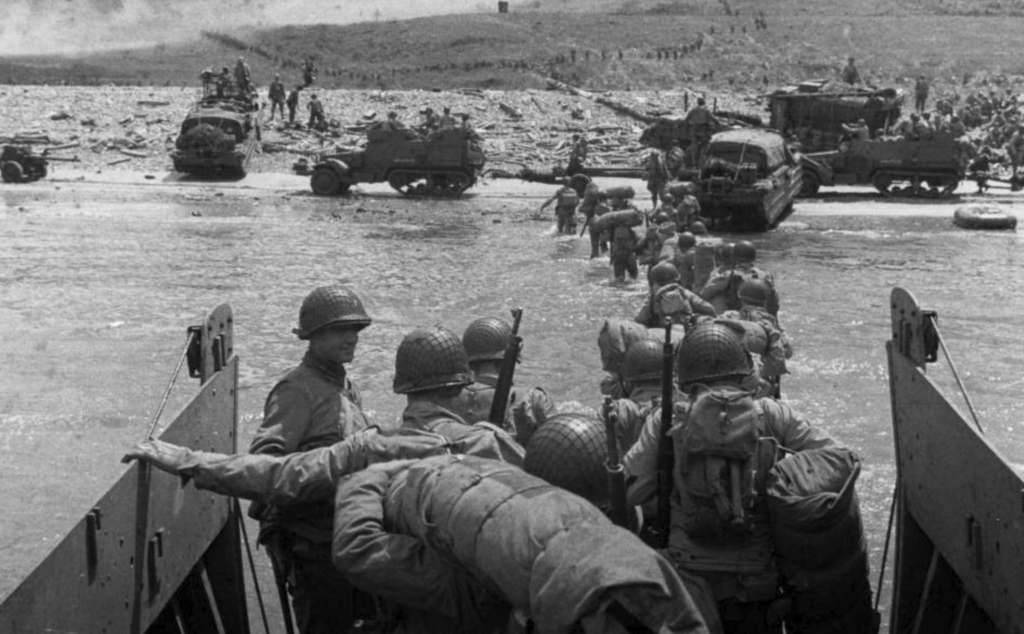
This article was originally published on The Federalist - Culture. You can read the original article HERE

June 6 marks the 80th anniversary of American, British, and Canadian troops landing on the coast of Normandy, France, in the greatest military mobilization in history, also known as D-Day. The New York Times reports that “fewer than 200 veterans of the allied invasion of Normandy, which marked a turning point in World War II, are still alive and sound enough to attend this year’s D-Day reunion in France.”
In the words of Gen. Dwight D. Eisenhower, whose team had been planning the mobilization for over a year, “These men came … to storm these beaches for one purpose only, not to gain anything for ourselves, not to fulfill any ambitions America had for conquest, but to preserve freedom.”
Eisenhower knew the importance and difficulty of the task ahead. If the mission failed, it would set back Allied efforts to defeat Nazi Germany for at least a year, resulting in the inhumane extermination of millions of more Jews and the deaths of countless thousands of soldiers.
As Winston Churchill and President Franklin Roosevelt believed, the D-Day invasion was essential if freedom were to flourish and Christian civilization — rooted in the inherent respect for and dignity of all humankind — were to be saved.
That is why in the wee hours before the launch of the invasion, Eisenhower told the courageous soldiers they were about to “embark upon the Great Crusade” and the “eyes of the world are upon you.”
He then concluded, “Let us all beseech blessing of Almighty God upon this great and noble undertaking.”
The fighting was fierce indeed. More than 4,400 Allied soldiers of the 156,000 deployed from the United States, Great Britain, and Canada would lose their lives. Another 10,200 were injured, including 6,600 Americans. Those who fought later said the waters of Normandy turned red from all the blood spilled.
Forty years later, at the 40th anniversary of D-Day, President Ronald Reagan gave a touching tribute to those men who stormed the Normandy beaches, in particular the most treacherous, Pointe du Hoc, saying:
The men of Normandy had faith that what they were doing was right, faith that they fought for all humanity, faith that a just God would grant them mercy on this beachhead or on the next. It was the deep knowledge — and pray God we have not lost it — that there is a profound, moral difference between the use of force for liberation and the use of force for conquest. You were here to liberate, not to conquer, and so you and those others did not doubt your cause. And you were right not to doubt.
He continued:
You all knew that some things are worth dying for. One’s country is worth dying for, and democracy is worth dying for, because it’s the most deeply honorable form of government ever devised by man. All of you loved liberty. All of you were willing to fight tyranny, and you knew the people of your countries were behind you.
Yet, despite the importance of this mission, its memory fades with each passing generation.
President Reagan warned us about this in his 1989 farewell address to the nation: “You know, four years ago, on the 40th anniversary of D-Day, I read a letter from a young woman writing to her late father, who’d fought on Omaha Beach. Her name was Lisa Zanatta Hehn, and she said, ‘We will always remember, we will never forget, what the boys at Normandy did.’”
He added, “Well, let’s help her keep her word. If we forget what we did, we won’t know who we are.”
But unfortunately, we are not keeping our word. For instance, one poll found that 12 percent of Americans thought Dwight Eisenhower fought in the Civil War (which ended 25 years before he was born), instead of leading the D-Day invasion! Perhaps even worse, another survey found that only 43 percent of Americans know the real reason we celebrate Memorial Day. These sad statistics are just another example of how neglecting to teach American history in our schools has taken a toll on our national memory.
This is tragic. Perhaps it is our time for us, as parents, to do what else President Reagan encouraged us to do in his farewell address: “An informed patriotism is what we want. And are we doing a good enough job teaching our children what America is and what she represents in the long history of the world? All great change happens in America at the dinner table. So, tomorrow night in the kitchen I hope the talking begins.”
That is why I wrote my book, Toward a Perfect Union: The Moral and Cultural Case for Teaching the Great American Story, to equip parents to do this, so our children and their children will never forget the bravery of the men who stormed the beaches and climbed the cliffs of Pointe-du-Hoc to preserve freedom. If we do not teach this, the freedom they fought so valiantly for will become a forgotten memory. So, 80 years later, let’s never forget the history of D-Day.
Timothy S Goeglein is vice president of Focus on the Family in Washington, and author of the book Toward a More Perfect Union: The Cultural and Moral Case for Teaching the Great American Story (Fidelis, 2023).
This article was originally published by The Federalist - Culture. We only curate news from sources that align with the core values of our intended conservative audience. If you like the news you read here we encourage you to utilize the original sources for even more great news and opinions you can trust!










Comments